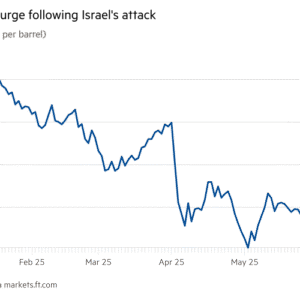
Unlock the White House Watch newsletter for free
Your guide to what Trump’s second term means for Washington, business and the world
The name’s bond. Treasury bond. The only force that has so far been able to stop Donald Trump, or at least make him rethink, is the US Treasury market. Republicans are supine; Democrats are in disarray; chief executives have taken cover; and America’s foreign partners tiptoe around Trump like he’s a minefield. Some judges are throwing sand into the gears. But they have not reversed Trump’s direction. Aside from Russia’s Vladimir Putin, what Trump fears most is the rising price of money.
But his fear is episodic. Twice now, US Treasury bond prices have dropped sharply in tandem with a weakening dollar. Foreign investors want to be better compensated for the risk of owning US debt. Since lower bond prices mean higher yields, the dollar and Treasuries usually go opposite ways. On the first occasion in April, Trump paused his global tariff war for 90 days. Bond prices recovered. On the second, last week, Trump resumed economic war with the EU, vowing a 50 per cent tariff. He also threatened Apple’s iPhone with 25 per cent duties. A US bond market conniption plus a “very nice call” from the president of the European Commission, Ursula von der Leyen, have on cue persuaded Trump to declare another pause.
Trump is by no means the only culprit for America’s mounting public debt, which at 123 per cent of GDP is at its second highest since the second world war. Since Bill Clinton balanced the budget, successive US administrations have added to the deficit. With the exception of Barack Obama, who tried to strike a grand bargain with Republicans, every other president has ignored America’s deteriorating finances. The worst offenders were George W Bush and Trump, who made large unfunded tax cuts. A close third is Joe Biden, who made little effort to raise taxes to pay for higher spending.
Until now, the bond markets were unfazed. What has changed? Two things. The first is Covid. The pandemic marked the end of the age of low inflation and easy money. Zero bound interest rates made everyone look good. However badly they managed the budget, US administrations could generally bet that growth would outstrip debt interest costs. That has now flipped. Trump’s “big, beautiful bill” that passed the House of Representatives last week will add more than $3tn to the US public debt over the next decade. Debt servicing costs will eat up a growing share of the pie. The bill’s spending cuts are both socially cruel and fiscally inadequate.
The second is Trump’s second term psychology, which is considerably more wayward than in his first. The writing on the wall is Liz Truss, Britain’s former prime minister whose short tenure was ended by the bond markets. The UK gilts market deemed the growth promises on which Truss based her unfunded tax cuts to be magical thinking. Much of the timidity of Labour’s chancellor of the exchequer, Rachel Reeves, can be attributed to fear of the Truss effect. Truss’s foolishness added a moron risk to UK government bonds.
Truss conveyed in the Washington Post last week that she had learnt nothing and forgotten nothing. “What I learned from my experience is the sheer power of the globalist economic establishment,” she wrote in an advice column for Trump. Bond prices are determined by countless actors including central banks, pension and insurance funds, non-western sovereign wealth funds and millions of individuals. Truss’s globalist establishment thus seems a bit unwieldy to hatch conspiracies. Its dastardly goal is to invest in a safe asset. That Truss-like doubt is now creeping into US Treasury bonds.
The Ernest Hemingway cliché — that America has been going bankrupt gradually and now suddenly — is doing the rounds. That is off the mark. The US would only default by choice not force. This could happen if Congress refuses to lift the US debt ceiling later this year. But that form of suicide would be eccentric even by today’s Washington standards. Or Trump could levy a charge on foreign owners of US Treasury bonds, which would be the same as default. Some of his advisers see this as a tool to drive down the dollar to make US exports cheaper. Again, though, even Trump might balk at cutting off America’s nose to spite its face. Mugging America’s lenders would be an instant way of crashing the market.
Which leaves Trump’s mercurial on-again off-again war on economic orthodoxy as our likely future. The markets are very much in the glass half full camp. Whenever Trump pulls back from the brink — by pausing tariffs, say, or promising not to fire US Federal Reserve chair Jay Powell — he triggers a relief rally. Even impersonal market forces are biased towards treating self-harming behaviour as abnormal. You have to go back Herbert Hoover in the early 1930s to find a US president so willing to do battle with economic reality.
In one respect Trump is like his recent Republican predecessors. He believes in tax cuts. What is novel is the foreboding Trump creates about faith in America’s credit. While red inks spreads from Washington, Trump is unleashing a wild west for cryptocurrency, AI, and to some extent banking. It would be melodramatic to predict the US reserve currency’s imminent dethronement. The conditions for a global financial crisis, on the other hand, should be taken seriously.




